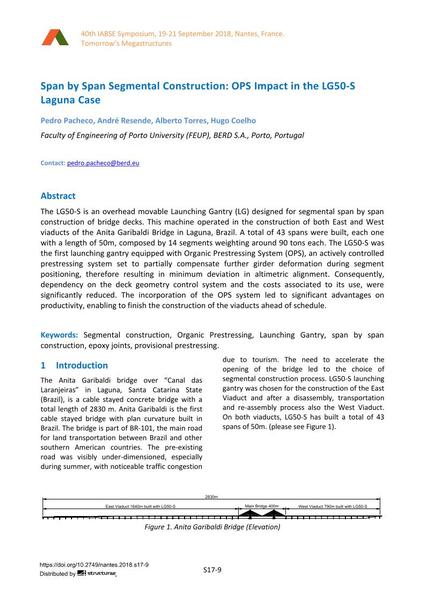Span by Span Segmental Construction: OPS Impact in the LG50-S Laguna Case

|
|
|||||||||||
Détails bibliographiques
| Auteur(s): |
Pedro Pacheco
(Faculty of Engineering of Porto University (FEUP), BERD S.A., Porto, Portugal)
André Resende (Faculty of Engineering of Porto University (FEUP), BERD S.A., Porto, Portugal) Alberto Torres (Faculty of Engineering of Porto University (FEUP), BERD S.A., Porto, Portugal) Hugo Coelho (Faculty of Engineering of Porto University (FEUP), BERD S.A., Porto, Portugal) |
||||
|---|---|---|---|---|---|
| Médium: | papier de conférence | ||||
| Langue(s): | anglais | ||||
| Conférence: | IABSE Symposium: Tomorrow’s Megastructures, Nantes, France, 19-21 September 2018 | ||||
| Publié dans: | IABSE Symposium Nantes 2018 | ||||
|
|||||
| Page(s): | S17-9 | ||||
| Nombre total de pages (du PDF): | 8 | ||||
| DOI: | 10.2749/nantes.2018.s17-9 | ||||
| Abstrait: |
The LG50-S is an overhead movable Launching Gantry (LG) designed for segmental span by span construction of bridge decks. This machine operated in the construction of both East and West viaducts of the Anita Garibaldi Bridge in Laguna, Brazil. A total of 43 spans were built, each one with a length of 50m, composed by 14 segments weighting around 90 tons each. The LG50-S was the first launching gantry equipped with Organic Prestressing System (OPS), an actively controlled prestressing system set to partially compensate further girder deformation during segment positioning, therefore resulting in minimum deviation in altimetric alignment. Consequently, dependency on the deck geometry control system and the costs associated to its use, were significantly reduced. The incorporation of the OPS system led to significant advantages on productivity, enabling to finish the construction of the viaducts ahead of schedule. |
||||
| Mots-clé: |
poutre de lancement
|
||||
